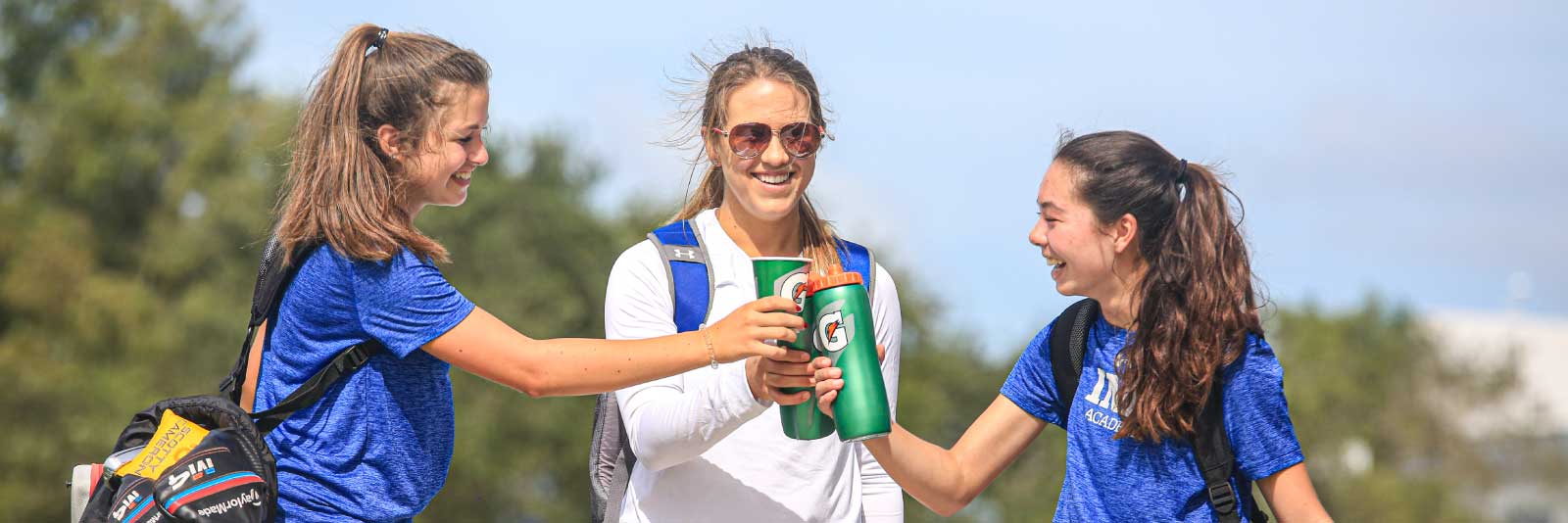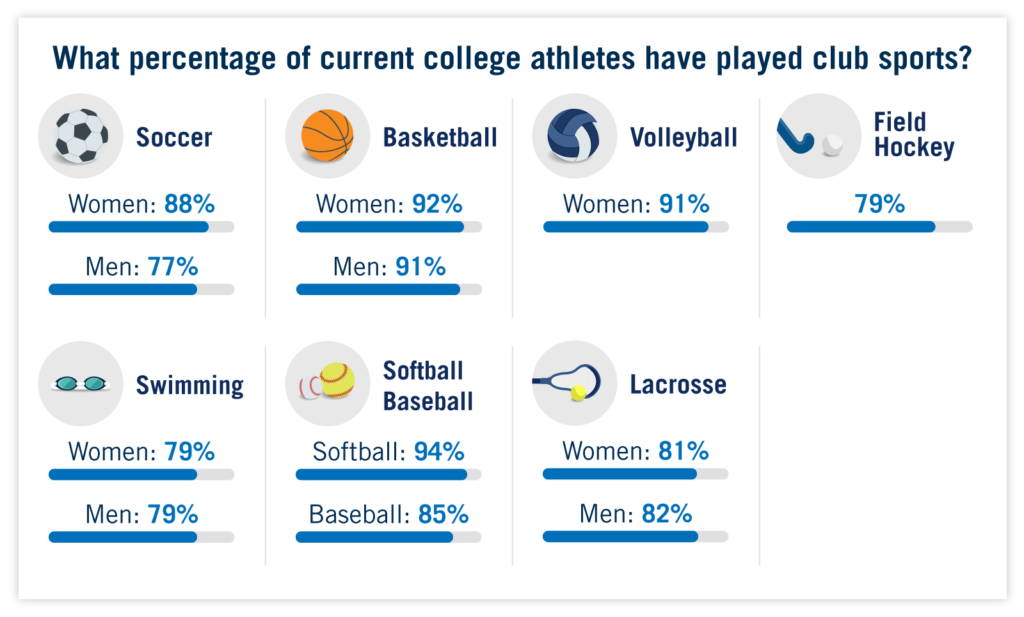High School vs Club Sports: Understanding the benefits

Over the years, parents and athletes have come to think of club sports as essential to getting recruited. Club sports offer an elevated level of play, and the schedule tends to line up with when college coaches recruit. Plus, many families believe that competing for a club team will increase their athlete’s likelihood of securing an athletic scholarship. With club sports being so important, families wonder what value remains in competing for a high school sports team?
High school sports still have a role to play in the college recruiting process. They offer athletes an opportunity to learn the value of competing on a team to represent their school, while balancing academics to remain eligible to play, which is very similar to the college athletic experience.
Of course, there are many factors that go into the club vs. high school sports debate. This page dives into the debate to help student-athletes and their families decide what’s best for them.
Do you have to play club sports to get recruited?
The short answer is, yes, because playing club sports is known to give athletes an advantage in the recruiting process. Club sports are offered year round, making it great for athletes to consistently focus on skill development, while also giving college coaches more opportunities to evaluate athletes during competitions. Data from a recent NCAA survey of current college athletes suggests that club sports are important to the college recruiting process, depending on what sport the athlete plays.

The NCAA recently surveyed current college athletes asking if they played club sports, high school sports or both. Athletes in several sports overwhelmingly reported that they played on both teams:
- Soccer: 88% of women and 77% of men competed on a club team.
- Basketball: 92% of women and 91% of men competed on a club team.
- Women’s volleyball: 91% of women’s volleyball players competed on a club team.
- Women’s field hockey: 79% of women’s field hockey players competed on a club team.
- Swimming: 79% of both women and men competed on a club team.
- Baseball/Softball: 94% of softball players and 85% of baseball players competed on club teams.
- Lacrosse: 81% of women and 82% of men competed on club teams.
At the opposite end of the spectrum, a mere 25% of football players competed on a club team. And only 28% of men’s track and 34% of women’s track athletes competed on a club track team.
Where do college coaches recruit?
When it comes to recruiting, most college coaches, with the exception of football coaches, focus most of their time attending club tournaments because these events allow them to evaluate significantly more athletes in one day. Not to mention, the talent level is generally higher than what they would see at a high school game.
The benefits of playing club sports
From year-round competition to cross country travel for events, club sports offer athletes experiences they can’t get at the high school level. Below are just a few of the benefits of competing for a club sports team.
Stay in competition shape
Most club teams compete all year, only taking a small amount of time off during holidays and after major competitions. This allows athletes to stay in competition shape and focus on their skill development and growth continuously.
Further your athletic career

Almost 90% of student-athletes who compete at the college level previously competed for a club team during the recruiting process. This shows that there is a strong connection between club sports and reaching the next level of competition.
Increase exposure
For many high school sports, their season starts at around the same time as the college sports season, which makes it very difficult for coaches to attend competitions. Because club sports compete throughout the year, college coaches have more opportunities to watch athletes compete during their off season.
Learn from the best coaches
Club coaches are licensed professionals who are qualified to do the job and passionate enough to dedicate much of their time to the sport. So, while club sports are more expensive, athletes know they are paying for a qualified coach who has the proper tools and resources to aid in their development.
Face a higher level of competition
High school sports teams are restricted to competing with local teams, which might not have the highest level of competition. At the club level, athletes compete with and against top-ranked players locally and across the country on a regular basis. This higher level of competition is key to helping athletes’ development, both in practice and during events.
Get the opportunity to travel
College sports teams spent a lot of time traveling on a bus or plane to competitions, and some athletes struggle to adjust to this schedule during their first year. Athletes who compete for a club team prior to college will have already experienced what it’s like to travel across the country to compete, which may better prepare them for the college travel schedule.
The benefits of playing high school sports
Playing high school sports can be a great learning experience for student-athletes, especially those looking to compete at the college level. High school sports can teach athletes valuable leadership skills, how to motivate players around them and how to develop skills at a different position, among other things. By taking the right approach, athletes can leverage their high school experience to help their college recruiting. Below are just a few of the benefits of competing for a high school sports team.
Less expensive
While there may be a few small costs associated with high school sports,In stark contrast, club sports require fees, equipment and can pile up the expenses for travel and meals. For families with a smaller budget, high school sports offer their athlete an opportunity to compete in their sport while keeping costs low.
More free time
Club sports require a much larger time commitment than high school sports. Not only do most club teams practice all year round, but they require athletes to travel for the big tournaments and events, some of which are out of state. High school sports generally have practice before or after school and a few local competitions per week. .s.
While the time commitment at the college level is similar to that of club sports, athletes may choose to only compete for their high school team in order to have more time to focus on other extra-curricular activities they are involved in or maintain an part-time job outside of school.
Opportunity for leadership and growth
While most club teams are generally stacked with talented players, high school teams don’t always see the same level of talent. This lets standout athletes step up and take a leadership role on the team. In some cases, this also offers athletes the opportunity to train and play more than one position. This makes high school sports an excellent opportunity for athletes to round out their skills and gain valuable experience.
Sense of school pride
One of the best things about competing for a high school team is the chance to represent one’s school and community through sports. As a team, athletes and their teammates work together to qualify for the playoffs, win a district title or even play for a state championship. This experience can be very rewarding and promotes teamwork to achieve a greater goal.
Less pressure to perform
Standout athletes will always want to perform to their best abilities, but high school sports tend to offer a more relaxed competition environment, especially without college coaches constantly evaluating athletes at big club games and tournaments. It’s easier for athletes to stay loose and have fun while playing at the high school level.
Academic eligibility
Much like at the college level, high school sports require athletes to keep their grades up in order to maintain eligibility. Academics play a very large role in the college recruiting process, as athletes are expected to meet certain requirements to be eligible to compete at the college level. Plus, once the athlete is in college, they will have certain standards that they must maintain to keep their spot on the team.
Choosing between club and high school sports
For families deciding whether or not to play club sports, it’s important to do your research and talk to other families in your sport. If your family is wondering what your best move is—club or high school—the decision will depend on your answers to a few different questions:
What are your goals as an athlete? Athletes who want to specialize in one sport should join a club team to hone in on sport-specific development and coaching. Multisport athletes competing in different sports year-round, might find their best fit playing high school sports where each one has a distinct season.
What sport do you play? Based on this NCAA survey data, to stay competitive in the recruiting landscape, soccer, basketball, baseball/softball and hockey players, as well as swimmers and gymnasts should look into joining a club team. For football players and track athletes, it’s not as essential to compete on a club team at this point.
Can you play both club and high school sports? Most current college athletes reported that they played both high school and club sports. For sports like baseball, this can be very realistic, as the baseball season (spring) doesn’t usually overlap with the travel season (summer). However, other sports—like soccer—are making it increasingly more difficult to do both. Do your research to learn what the season is like for club teams and your high school team. You don’t want to have a huge overlap and get injured from playing too much.
Recruiting resource: club and high school coaches
Like many sports, college athletic recruiting is a team effort. In recruiting, your team includes your high school/club coach. Your current coach can offer invaluable support during your recruiting journey, as they are often very invested in helping their athletes continue competing at the next level. High school and club coaches generally have strong relationships with college coaches and use recruiting tools like NCSA’s Club & HS Coach services to help their athletes get recruited.
Here are four key ways your high school/club coach can help:
Determine the division that’s right for you
Your high school/club coach knows your style of play, how you compete against tough competition, and your personality and character—all of which are important to college coaches. They can take all of these factors into consideration when projecting which division level would be the best fit for you.
Make introductions to college coaches they know
Many high school and club coaches know a few college coaches, and if they think you would be a good fit for those schools, they may facilitate an introduction. However, remember that just because your coach has a relationship with a specific college, it doesn’t mean that you should try to force that school to be a good fit for you.
Arrange a call between you and a college coach
For most athletes, recruiting starts before the NCAA recruiting rules allow college coaches to contact athletes. High school/club coaches can help arrange a time for the recruit to call the college coach, letting the college coach know when to expect the call.
Provide a recommendation
When college coaches are interested in a recruit, they often seek out people who know the recruit well for recommendations, aka your high school/club coach. Because your current coach knows you so well as an athlete, they are arguably the most important person a college coach will talk to in order to get a better idea of your athletic ability and character.